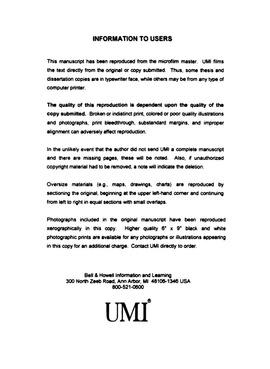| dc.contributor.advisor | Merrill, Kenneth R., | en_US |
| dc.contributor.author | Durand, Kevin Karl Jones. | en_US |
| dc.date.accessioned | 2013-08-16T12:31:00Z | |
| dc.date.available | 2013-08-16T12:31:00Z | |
| dc.date.issued | 2000 | en_US |
| dc.identifier.uri | https://hdl.handle.net/11244/6007 | |
| dc.description.abstract | Whitehead's metaphysical and ethical arguments accomplish two related goals. The first is a criticism of modern ethical theory---the Utilitarian views of Sidgwick and Mill and the Theistic Intuitionism of the Cambridge Moralists (itself founded on Kantian Deontological commitments). I argue that Whitehead's rejection of these views depends on a rejection of the subject/predicate substance metaphysics inherited by Sidgwick, et al, from Aristotle, a rejection of the method of philosophizing that is drawn from 19th-century interpretations of Aristotle, and an amended view of the role of common-sense in speculative philosophy. From these negative views, along with his positive metaphysical, ethical, and methodological commitments, I show that Whitehead provides a theory of virtue that replaces its Utilitarian and Intuitionist competitors and stands as a rival to generally Aristotelian virtue ethics. | en_US |
| dc.format.extent | vii, 378 leaves : | en_US |
| dc.subject | Utilitarianism. | en_US |
| dc.subject | Philosophy. | en_US |
| dc.subject | Sidgwick, Henry, 1838-1900. | en_US |
| dc.subject | Ethics | en_US |
| dc.subject | Whitehead, Alfred North, 1861-1947. | en_US |
| dc.title | The role of metaphysics, common-sense, and interpretations of classical Greek philosophy in Sidgwick's utilitarianism and Whitehead's virtue ethics. | en_US |
| dc.type | Thesis | en_US |
| dc.thesis.degree | Ph.D. | en_US |
| dc.thesis.degreeDiscipline | Department of Philosophy | en_US |
| dc.note | Major Professor: Kenneth R. Merrill. | en_US |
| dc.note | Source: Dissertation Abstracts International, Volume: 61-06, Section: A, page: 2329. | en_US |
| ou.identifier | (UMI)AAI9977949 | en_US |
| ou.group | College of Arts and Sciences::Department of Philosophy | |
